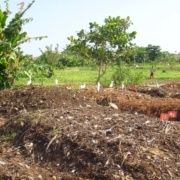
Photo by Eosta
Waddinxveen, 10 March 2018 – ‘Natural branding’ is the technique by which fruit and vegetables are ‘branded’ with laser beams. The laser removes a bit of the pigment on the outer layer of the skin. The Dutch organic wholesaler, Eosta in Waddinxveen, was the first to use this technique a few years ago. The company is branding more and more individual pieces of fruit and vegetables. What are the prospects of this technique in the fight against unnecessary plastic packaging? An interview with Eosta’s sustainability manager, Michaël Wilde.
Natural branding seems the perfect alternative to plastic packaging. Are any supermarkets in the Netherlands using this technique?
Eosta supplies organic fruit and vegetables to supermarkets. These products need to be distinguished from non-organic fruit and vegetables by the cashiers. Because of this, the end result was that the organic fruit and vegetables were packaged. This is not desirable at all because the customers that buy organic products are often the ones that condemn plastic packaging. If we brand these products with the laser technique, it would make a huge difference to the immense quantities of packaging materials. Hoogvliet was the first supermarket to sell branded avocados and ginger. Albert Heijn is currently experimenting with mangoes. The technique is generating much interest.
The greatest difference to be made in reducing packaging is in the non-organic fruit and vegetables. Is Eosta looking at this too?
No, we only work with organic and pure products. But the technique itself is of course suitable for non-organic products too – as long as the cashiers can distinguish between the organic and the non-organic products. Given the discussion in society about reducing single-use plastic packaging, we believe that more retailers will come to us for the laser technique. We were the first to offer this service, and we would only welcome more suppliers on the market.
The European Commission wants to drastically reduce the volume of single use plastics. Do you think that politics should encourage the use of laser technique?
We don’t think it should be done directly, but could be done indirectly. What would help, for example, is if governments made plastic packaging more expensive. This would automatically bring other techniques to the fore. Laser branding is still relatively expensive, but the machines are getting cheaper and more compact every year. On top of this, the products that initially could not be laser branded, such as lemons, can now be laser branded. Natural branding is still evolving. At the moment we laser brand imported products, but if the machines become cheaper and more mobile, suppliers could brand their own products themselves. The machine could be placed in plantations during the harvest.
Do you see a role for consumers?
Yes, definitely. Consumers can vote with their feet. They make choices every day such as, in our case, choosing for organic and packaging free. Interest in our technique is growing, partly because consumers are starting to demand it. In the United Kingdom for example, consumers are demanding packaging free aisles and shops – and these are coming too. Natural branding has come at the right time and has started an unstoppable journey.






